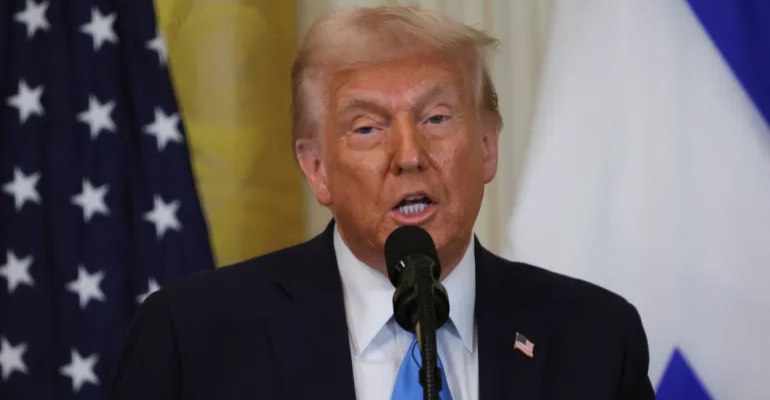Shafaq News/ US President Donald Trump pursued a hardline policy towardIran, reinstating tough economic sanctions and imposing sweeping restrictionsaimed at curbing Tehran’s nuclear ambitions and regional influence.
In a National Security Presidential Memorandum (NSPM), Trump reimposedeconomic and diplomatic pressure, declaring that Iran should be denied anuclear weapon and intercontinental ballistic missiles, Iran’s “terroristnetwork” should be neutralized, and Iran’s “aggressive” development ofmissiles, as well as other asymmetric and conventional weapons capabilities,should be countered.
The NSPM directed the Secretary of the Treasury to impose maximumeconomic pressure on Tehran by sanctioning or enforcing penalties on thoseviolating existing sanctions. It also required the Treasury Secretary to issueguidance to business sectors—including shipping, insurance, and portoperators—on the risks of engaging in transactions that violate US sanctions orinvolve Iranian-backed groups.
Additionally, the Secretary of State was instructed to modify or rescindexisting sanctions waivers and work with the Treasury Department to driveIran’s oil exports to zero.
"The previous Administration’s tolerance of Iran’s threats toAmerican citizens and companies ends now," the White House stated.
"The Attorney General will pursue all available legal steps toinvestigate, disrupt, and prosecute financial and logistical networks,operatives, or front groups inside the United States that are sponsored by Iranor an Iranian terror proxy."
"The Attorney General will prosecute leaders and members ofIranian-funded terrorist groups that have captured, harmed, or killed Americancitizens and seek their arrest and extradition to the United States."
"President Trump will not tolerate Iran possessing a nuclearweapons capability, nor will he stand for their sustained sponsorship ofterrorism, especially against U.S. interests."
During an exchange with reporters while signing the executive order,Trump was asked about potential Iranian retaliation, including threats againsthis life.
"If they did that, they would be obliterated," Trump said,calling for the U.S. government to impose maximum pressure on Tehran."I’ve left instructions if they do it, they get obliterated, there won’tbe anything left."
In 2020, Trump reaffirmed his stance, declaring, "As long as [heis] President of the United States, Iran will never be allowed to have anuclear weapon."
Despite this tough rhetoric, Trump expressed a willingness to negotiate."I say this to Iran, who's listening very intently, 'I would love to beable to make a great deal. A deal where you can get on with your lives,'"he told reporters in Washington after a meeting with Israeli Prime Minister BenjaminNetanyahu.
"They cannot have one thing. They cannot have a nuclear weapon andif I think that they will have a nuclear weapon ... I think that's going to bevery unfortunate for them," he said.
The relationship between the United States and Iran has undergone shiftsbetween the Trump and Biden administrations, reflecting starkly differentapproaches to Tehran’s nuclear ambitions and regional influence.
Under President Donald Trump, Washington withdrew from the 2015 JointComprehensive Plan of Action (JCPOA) and reimposed stringent economicsanctions. Trump’s administration sought to cripple Iran’s economy to forceTehran into a new deal with stricter terms. The strategy aimed to curb Iran’snuclear activities and limit its influence across the Middle East, particularlyits support for proxy groups.
However, while the sanctions dealt a severe blow to Iran’s economy, theyfailed to bring the Iranian government back to negotiations on US terms.Instead, Tehran escalated its nuclear program, enriching uranium beyond thelimits set by the JCPOA and increasing tensions in the region.
President Joe Biden took a different approach, seeking to revivediplomatic efforts to re-enter the JCPOA and ease some sanctions in exchangefor Iran’s compliance with nuclear restrictions. His administration engaged inindirect negotiations with Tehran, attempting to restore elements of the dealabandoned under Trump.
However, Biden faced criticism from opponents who argued that hisstrategy lacked sufficient pressure to curb Iran’s nuclear advancements or itsregional activities. Talks to revive the agreement stalled, while Irancontinued expanding its nuclear program and strengthening ties with Russia andChina as alternatives to Western engagement.
Read More Details
Finally We wish PressBee provided you with enough information of ( Trump’s ‘Maximum Pressure’ on Iran: to curb nuclear ambitions, counter influence )
Also on site :
- Greta Thunberg bizarrely claims she DIDN’T KNOW her ‘Freedom Flotilla’ crewmates had shown support for Hamas & Hezbollah
- Trump says reconciliation with Musk is possible in interview before Tesla boss’s apology
- Waste accumulation threatens health of al-Kashkiya residents in Deir Ezzor

